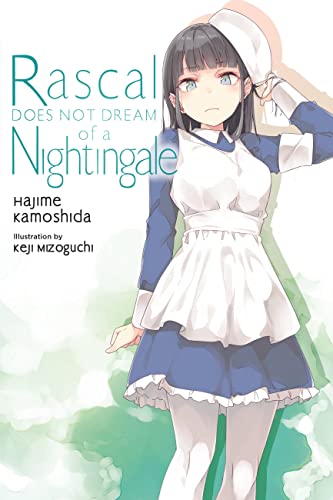By Hajime Kamoshida and Keji Mizoguchi. Released in Japan as “Seishun Buta Yarou wa Nightingale no Yume wo Minai” by Dengeki Bunko. Released in North America by Yen On. Translated by Andrew Cunningham.
When I first saw the title, I wondered why we were getting two “singer” books in a row, and wondered if we’d be hitting all of Sweet Bullet. But no, this is not “Nightingale” as in “sang in Berkeley Square”, it’s “Nightingale” as in “Florence Nightingale”. I’m not sure if the author is TRYING to hit every single fetish, but it’s certainly true that, after commenting on the miniskirt Santa he met last time, he has to deal with several nursing school students this time around. Including, unfortunately, his old nemesis Saki. Fortunately, both of them have grown up to the point where they can actually tolerate each other in short bursts. As for the actual person who stars in this volume, we’ve seen her before as well. She was briefly in Sakuta’s high school in the “other universe” in Book 9, and he briefly saw her at college last book. And, as it turns out, she’s heavily connected to his past.
After briefly meeting up with Yuuma and Rio for a day outing, and confirming that Yuuma is quite happy being written out of the series, Sakuta goes back to trying to solve the problem of Touko Kirishima and the resurgence of Adolescence Syndrome. Of course, this being Sakuta, “trying” is perhaps too strong a word. What he ends up finding is that Ikumi Akagi, his old classmate from junior high, has been going around doing good deeds. Horrifying, right? It turns out that these good deeds are connected to a social media tag where people confess prophetic dreams, and Ikumi has been using that to try to stop the bad prochecies from coming true. This bothers Sakuta, who has first hand experience about why doing that can be a terrible idea. That said, what’s more bothersome is the fact that she’s making him remember what happened back in junior high, i.e. the events that led to the main plotline of this series.
This isn’t a harem series. Really. Sakuta has remained faithful to Mai the entire time, and the two have several lovey-dovey scenes together. It’s just that Sakuta has that combination of a bad-boy personality combined with good-boy actions that leads everyone to be drawn to him. Ikumi is no exception, and I actually want to be circumspect here, because I thought a lot of the aspects of her syndrome, as well as the cause and resolution, were very clever in a series that’s already pretty clever, so I don’t want to give it away. At heart, this is about how hard to can be to live up to your own expectations. Ikumi feels she failed Sakuta in junior high, and has never been able to get over it. Sakuta always feels like he’s doing the wrong thing, especially after going to the other world and finding a Sakuta who seemingly did everything right. We are our own worst critics.
Good stuff, even if it still feels like a series that ended at Book 9 and the publisher is locking the author in a room until they write more because it’s got movies coming out.
